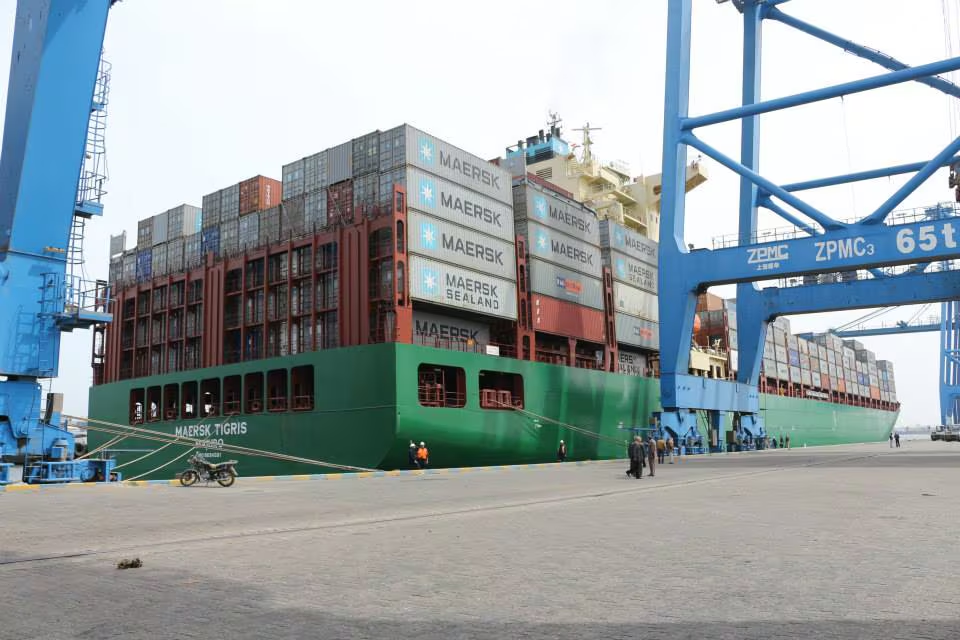WASHINGTON — Iranian vessels fired upon a cargo ship flagged to the Marshall Islands Tuesday morning, forcing the ship to travel deeper into Iranian waters — and setting off another round of tensions between Iran and the US.
Col. Steven Warren, Pentagon spokesman, confirmed that Iranian patrol vessels intercepted the shipping vessel Maersk Tigris around 5 a.m. Washington time. At that time, the vessels ordered the ship to travel deeper into Iranian waters. It is not clear if the Maersk had inadvertently traveled into Iranian territory.
When the Maersk did not respond immediately, the Iranian vessels fired shots across the bow of the cargo ship, which then complied with the order. The Iranian forces then boarded the vessel.
Warren said the ship is now located in the "vicinity" of Larak Island, in the Strait of Hormuz. According to VesselFinder.com, the ship was traveling from Jeddah in Saudi Arabia to Jebel Ali in the UAE.

The Maersk Tigris is flagged to the Marshall Islands.
Photo Credit: Damietta Port Authority
Although the Marshall Islands are a sovereign nation, the US has "full authority and responsibility for security and defense" of the islands, according to a State Department fact sheet. That puts a US response in play in what represents an escalation of the standoff between Iran and the US.
After receiving a distress signal from the cargo ship, Naval Forces Central Command dispatched the destroyer Farragut to proceed at best speed to the location of the Maersk and has sent a single maritime patrol and reconnaissance aircraft to observe the situation, Warren said. He did not clarify what that aircraft was, but the Navy counts both the P-3 and P-8 under that designation.
Warren said that it is "unlikely" Farragut would enter Iranian territory.
He added that there were no American citizens onboard the vessel, which has a crew of about 30.
Warren said that at first glance the situation "seems to be provocative" on the part of the Iranian ships, but noted that there are still gaps of information about the initial incident.
"It is inappropriate" on the part of the Iranian forces, he added.
The Navy has directed the destroyer Farragut to proceed at best speed to the location of the Maersk and has sent aircraft to observe the situation, Warren said. He added that there were no American citizens onboard the vessel.
The past week has seen a spike in tensions between the two countries after US Navy ships began shadowing a convoy of Iranian cargo ships that the Pentagon believed may be carrying weapons to aid militant forces in Yemen.
That situation dispersed last week when the Iranian convoy turned away from Yemen, but no doubt remains fresh in the minds of both nations.
Asked if the seizure of the Maersk was retaliation for last week's standoff, Warren said there was "no way to know" at this time.
Craig Allen, a professor at the University of Washington with an expertise in maritime law, called Iran's actions "highly unusual."
"Iran often beats its chest about shutting down this strait as a countermeasure to Western aggression, but it's all been talk up to this point," Allen said. "Actually pulling a commercial vessel out and pulling it into an Iranian port, I'm shocked."
Allen explained that the Strait of Hormuz operates under the law of transit passage as laid out by a 1982 UN convention on the law of the sea. Although neither the US nor Iran signed that convention, the nations have still treated the rules of navigation transit as legally binding in the past.
The rules of transit passage guarantees any vessel the right to use the strait with only "very limited" restrictions, Allen said. Those restrictions include if the ship is not proceeding without delay through the strait or is excessively polluting.
Those rules seem to be broad enough that Iran could claim a violation — it would be easy to claim the shipping vessel was moving too slowly through its waters or dumped trash overboard — yet Allen said such actions are extremely rare.
While acknowledging it is possible that Iran could have been responding was acting in response to the US actions last week, Allen brought up a slightly different possibility, one that could set the naval status quo of the region on its side.
"Obviously, the Iranians and Saudis aren't getting along right now," Allen said, before noting that the ship came from a Saudi port. "Maybe Iran believes the rules are shifting to the law of naval warfare with Saudi Arabia… The fact it's coming out of Saudi Arabia, I have to think the Iranians somehow are connecting this to the Saudi action on behalf of the government."
Email: amehta@defensenews.com
Twitter: @AaronMehta
Aaron Mehta was deputy editor and senior Pentagon correspondent for Defense News, covering policy, strategy and acquisition at the highest levels of the Defense Department and its international partners.








